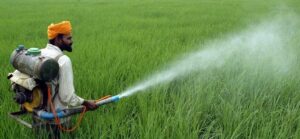Organic Farming : Hello farmers, today we will talk about organic farming in India, including types, methods, and advantages. Indian farmers can gain a better understanding of organic farming through this blog.
The use of harmful pesticides and fertilizers is putting some people’s lives at risk. India faces a major population growth problem. Food needs are increasing due to population growth. Human health and nature are adversely affected by the use of chemical fertilizers, toxic pesticides, and hybrids to meet the need for food production. It is only through organic farming that we can protect ourselves and nature from deadly chemicals. Farmers in India are becoming more aware of organic agriculture.
It is not a new process of farming to practice organic farming. India’s organic farming method aims to maintain the soil’s health by planting crops. Do you know how organic farming is done? We use organic waste, waste crops, animal and farm waste, aquatic waste, and other organic materials. Currently, this blog will provide you with the best and most effective organic farming methods in India.
What is Organic Farming in India
Organic farming in India uses organic manure and animal or plant waste to control pests. To combat the damage caused by synthetic fertilizers and chemical pesticides, this farming began. An ecological balance is being repaired, maintained, and improved through this system of agriculture. Inorganic inputs, such as green manures, cow dung, and organic fertilizers, are used in organic farming.
Read More: India’s Sugarcane Harvester: Uses and Advantages
India’s Organic Farming Principles
The principles of organic agriculture guide the growth and development of the industry. The world can benefit from these improvements in organic agriculture.
Organic farming is based on four principles:-
-
Principles of Health – The health of the ecosystem, people, and communities.
-
The Principles of Ecology – The right balance between ecosystem and environment or nature.
-
Principles of Fairness – Good human relationships and quality of life.
-
Principles of Care – The considerations about the environment and environment of the future.
The types of organic farming
There are two types of organic farming. Below are some examples of organic farming in India.
(a) Pure organic farming : The goal of pure organic farming is to avoid all unnatural chemicals. Pesticides and fertilizers are obtained from natural sources in pure farming. Pure organic farming is what it is called. High productivity can only be achieved through pure organic farming.
(b) Integrated organic farming: Nutrient management and pest management are integral parts of integrated organic farming.
Organic Farming in India: Frequently Asked Questions
Organic agriculture covers approximately 2.78 million hectares in India. The main organic products grown in India are oilseeds, tea, coffee, dried fruits, millets, cereals, spices, etc. India produces a large amount of these products and exports them. In India, organic products are mostly grown in Sikkim, Uttarakhand, and Tripura. Madhya Pradesh, Rajasthan, and Maharashtra are other states that practice organic farming.
Read More: Dragon Fruit Cultivation: Complete Information About Dragon Fruit
Organic farming techniques
In India, organic farming is practiced in a few ways. Check out the techniques below to learn how it is carried out.
1. Soil Management

Organic farming in India is primarily based on soil management. As soil is cultivated, its nutrients are lost and its fertilizer is depleted. Soil management involves recharging soil with all the necessary nutrients. Natural methods are used to increase soil fertility in organic farming. Animal waste contains bacteria that are used in this method. It is the first organic farming method on the list of methods that uses bacteria to make the soil more productive and fertile.
2. Managing weeds

Weed control is the main objective of organic farming. A weed is an unwanted plant that grows along with the crop. As a result of weeds adhering to the soil’s nutrients, crops were not able to produce as much.
In order to get rid of weeds, there are two methods.
-
Moving or cutting: The weed needs to be cut in this process.
- Mulching : To block the growth of weeds, farmers use a plastic film or plant residue on the surface of the soil.
3. Diverse crops

Crop diversity is one of the most famous organic farming techniques in India because it allows different crops to grow together to meet the growing demand.
4.Farming and chemical management

There are both useful and harmful organisms on agricultural farms. Controlling the growth of organisms is crucial to saving crops and soil. To protect soil and crops, natural or less toxic chemicals, herbicides, and pesticides are used. In order to control other organisms, the area needs to be properly maintained.
5. Control of biological pests

Using living organisms to control pests without using chemicals is one method of pest control. Indian farmers practice organic farming techniques.
The advantages of organic farming
-
In India, organic farming is very economical, since it does not use expensive fertilizers, pesticides, or HYV seeds. Expenses are not incurred.
-
Farmers can earn good returns on investment by using cheaper and local inputs. Organic farming in India has many benefits, including this.
-
Organic products are in high demand in India and around the world, and exporting them can increase income.
-
Compared to chemical and fertilizer-based products, organic products are more nutritious, tasty, and good for the body.
-
There is no chemical or fertilizer used in organic farming in India, which is very eco-friendly.
Organic farming is beneficial for everyone, as demonstrated by these benefits. In order to encourage organic farming in India, we need to spread awareness about its advantages.
Read More: Top 10 Agriculture States in India: Largest Crop Producers!
The disadvantages of organic farming
-
There are fewer options for organic farming in India, and there are fewer options for off-season crops as well.
-
In the early years, organic agricultural products are scarce. Mass production is difficult for farmers.
-
Lack of marketing and inadequate infrastructure are the main disadvantages of organic farming.
Below are the types of organic farming, methods, and advantages of organic farming in India. This blog will provide you with all the information you need regarding organic farming techniques.
If you want to know more about organic farming in India, organic farming types, and how it is done, click here. We will keep you updated with more information.
Aarug Agro will keep you updated with more information.


